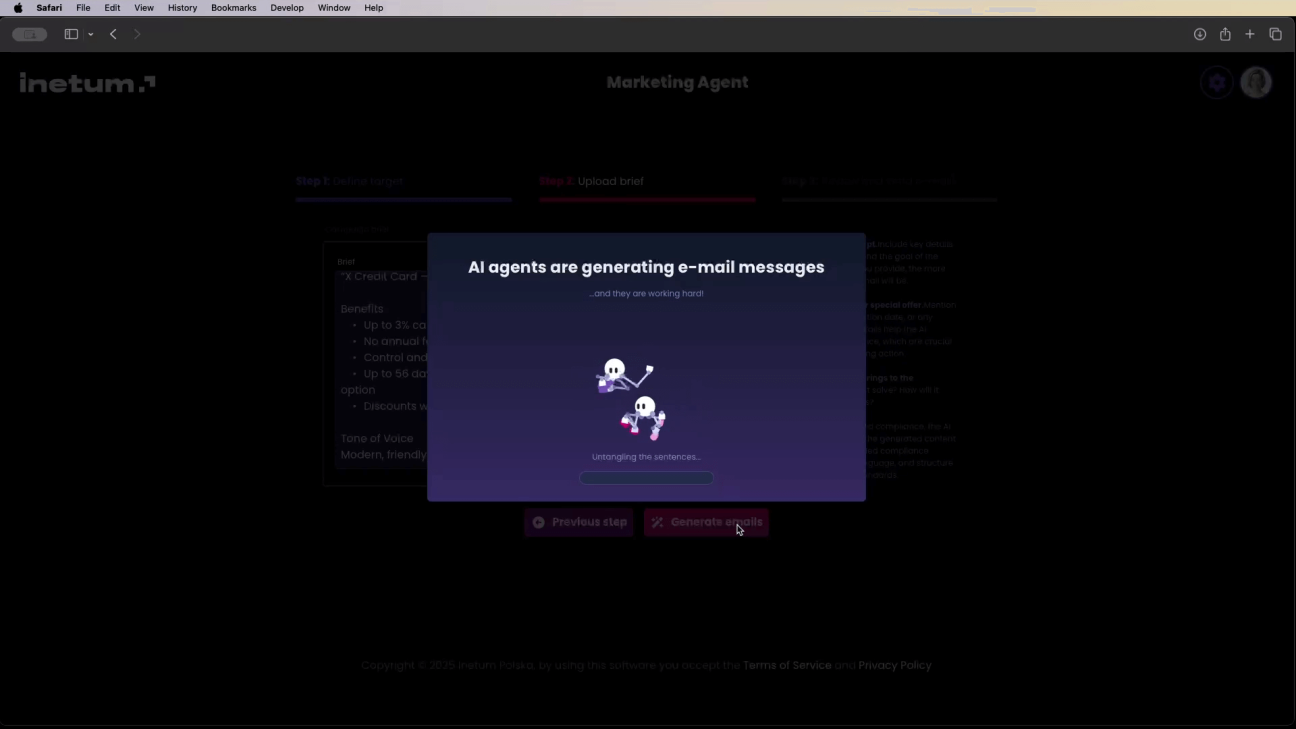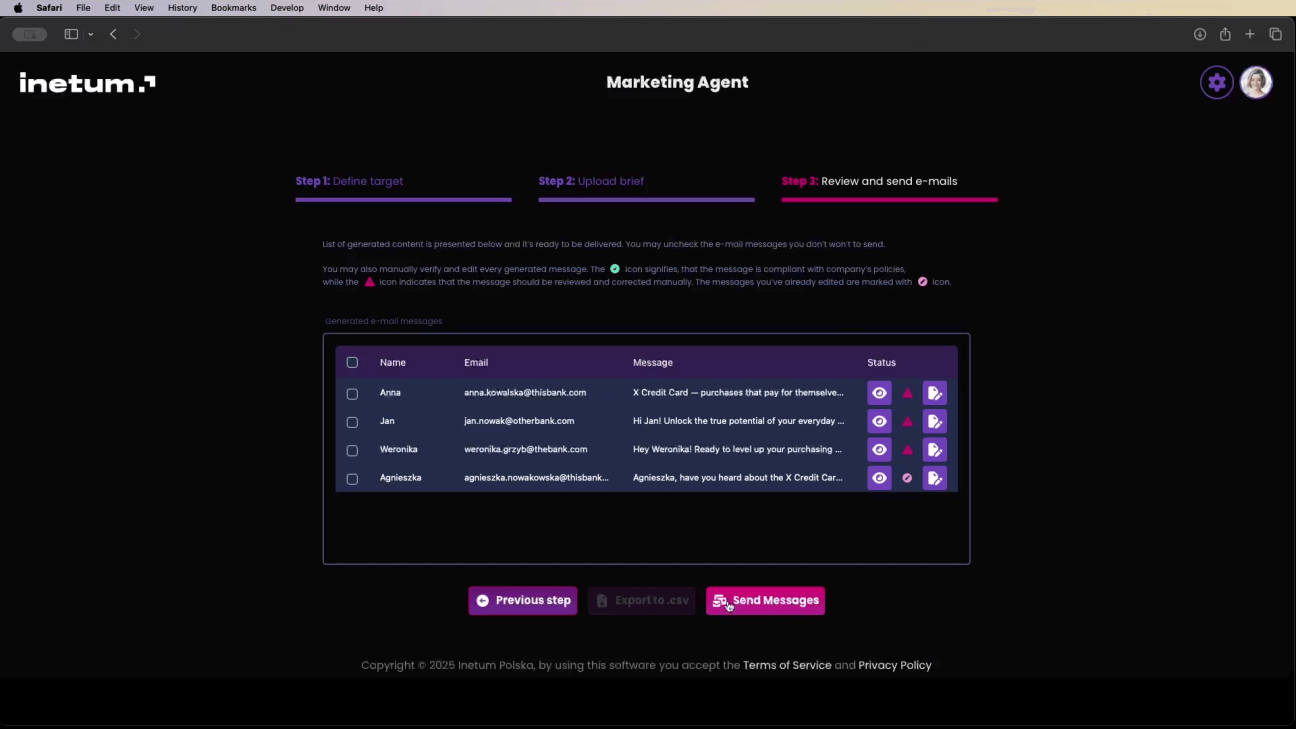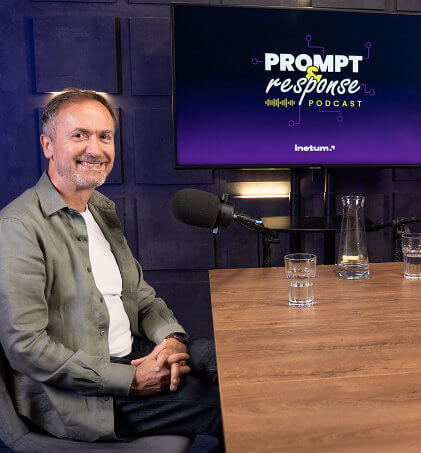In our Prompt & Response webcast, we talk about real AI solutions across different business functions and invite practitioners to share how they actually feel about AI in their areas. This article expands on the first episode, focusing on how an AI marketing agent can transform campaigns by making them faster, more personalized, and – crucially – compliant. If you’ve ever wondered how to balance personalization with GDPR rules, or how to automate marketing tasks without losing the human touch, this read is for you.
- 1. What is an AI agent in marketing
- 2. How AI marketing tools change the way campaigns are built
- 3. From traditional marketing to AI marketing automation
- 4. What are the benefits of AI agents for marketing teams?
- 5. How does AI outreach work in practice?
- 6. Why marketing ai agents don’t replace human creativity
- 7. How do AI agents handle data, compliance, and trust?
- 8. What are real use cases for AI agents in marketing campaigns?
- 9. Marketing operations via agentic AI and multimodal campaigns
- 10. Top 7 benefits of AI marketing agents in 2025
- 11. The rise of AI marketing agents
- 12. Key takeaways
What is an AI agent in marketing, and why does it matter in 2025?
An AI agent is more than a chatbot. It’s an intelligent system designed to act, decide, and iterate autonomously – not just used for content creation. In Prompt & Response, we explored how an AI marketing agent can:
- select the right audience,
- draft personalized notes,
- check every line against compliance rules before sending anything out.
Why does this matter in 2025? Because customers expect precision. Spray-and-pray outreach no longer works. Every marketer knows the frustration of sending broad messages that erode trust. AI agents in marketing address this head-on: they enable “segment of one” campaigns, tailoring offers based on real-time data and keeping every message safe from compliance mistakes.
How AI marketing tools change the way campaigns are built
Think of your last email campaign. You probably spent weeks preparing content, segmenting audiences, and waiting for compliance approval. Now imagine the same campaign being drafted, vetted, and approved in minutes with help of AI marketing agents.
The workflow looks like this:
- A targeting agent selects customers based on data-driven signals.
- A marketing agent tailors the copy, using natural language that reflects your brand’s voice.
- A compliance agent reviews tone, claims, and legal constraints, automating 80% of manual checks.
- A human reviews the messages and gives a final “go”.
The result? Faster campaign execution, higher personalization, and reduced risk. For marketing teams, this feels like getting an extra colleague — an AI assistant who never gets tired of reviewing copy.
From traditional marketing to AI marketing automation
Traditional marketing relied on intuition, manual data pulls, and creative brainstorming. AI marketing automation introduces precision: instead of blasting generic newsletters, AI tools tailor each outreach based on customer activity.
Marketers can now:
- Automate repetitive marketing tasks without losing control.
- Integrate AI features directly into their existing marketing stack.
- Optimize campaign timing, wording, and targeting using signals based on real-time data.
Just as spreadsheets once transformed finance, AI-powered agents are now reshaping marketing operations.
What are the benefits of AI agents for marketing teams?
Let’s break it down:
- Time savings – campaign assets in minutes, not days.
- Hyper-personalization – offers tailored to individual behaviors, not just segments.
- Compliance by design – every campaign includes an audit trail, reducing sleepless nights for legal teams.
- Scalable creativity – generative AI combined with marketer insights to tailor messages across multiple channels.
According to McKinsey, personalized campaigns can drive 10–15% revenue uplift. The benefits extend beyond marketing teams. Customers receive fewer irrelevant offers and gain more trust in the brand.
How does AI outreach work in practice (and why does it feel human)
One highlight from our webcast demo was seeing AI outreach in action. Imagine entering a simple product brief and letting an AI agent tailor hundreds of one-to-one messages, each checked for compliance before being released.

It’s like hiring a team of AI-powered agents who perform sales and marketing activities tirelessly. They:
- Follow the rules.
- Integrate with your data.
- Optimize the message structure instantly.

Still, agents cannot fully replace human oversight. Marketers remain the editors who ensure authenticity.
Common frustrations: why marketing AI agents don’t replace human creativity
As Beata, our head of marketing, put it: “Sometimes AI-generated content feels generic. I can spot it instantly.”
AI systems generate at scale, but agents don’t always capture brand nuance. That is why human input remains vital. Marketers fine-tune tone, context, and cultural references. The lesson is simple: marketing AI agents are intelligent, but they’re not artists.
How do AI agents handle data, compliance, and trust?
Every marketer dreams of full automation, but compliance is the non-negotiable backbone. GDPR fines, the EU AI Act uncertainties, and ethical risks make caution essential.
As Wiktor Zdzienicki, Inetum’s AI & Data Practice Leader, reminded us: “Garbage in, garbage out.” Poor data quality means poor results. AI systems must work with clean, unified customer data to succeed.
That is why AI agents integrate compliance at every step. They timestamp each decision, route sensitive cases to human review, and keep regulators off your back.
What are real use cases for AI agents in marketing campaigns?
From banks to telecoms, use cases for AI are expanding. Imagine:
- A retail bank using an AI marketing agent to target customers eligible for loan offers without violating GDPR.
- A telecom firm reducing churn by letting an agent tailor offers during live customer service calls.
- A B2B company automating email marketing at scale while ensuring every claim is accurate.
- An e-commerce retailer using AI agents to analyze data from 50,000 products in Google Ads, segment items by performance, allocate budgets dynamically, and optimize ROAS across campaigns.
These examples show how AI agents for marketing improve both marketing performance and compliance. They allow teams to perform marketing functions across multiple channels, while staying aligned with marketing objectives.
The future of AI: marketing operations via agentic AI and multimodal campaigns
Looking ahead, the future of AI lies in agentic AI: systems that not only generate content but act independently across business processes. Imagine a generation agent that drafts text, a knowledge base agent that sources references, and a compliance agent that approves, all running in the background.
In marketing in 2025, multimodality will matter most. Agents can even generate images, videos, or personalized graphics, tailoring assets for each customer. This is where agents operate like true colleagues, enhancing marketing effectiveness while marketers focus on strategy.
Top 7 benefits of AI marketing agents in 2025
- Time savings through automation of campaign workflows
- Hyper-personalization at scale (“segment of one”)
- Compliance by design with GDPR and EU AI Act
- Built-in predictive analytics to anticipate customer needs
- Audit trails for defensible compliance
- Integration with CDP and marketing platforms without rip-and-replace
- Improved customer trust and engagement
The rise of AI marketing agents
AI marketing agents stand out for three reasons:
- Speed: they process massive data sets in seconds.
- Predictive analytics: they forecast customer needs and market trends.
- Compliance: they automate rule-checks and create audit trails.
Instead of relying on fragmented spreadsheets or manual reviews, marketers get clear insights that improve campaign targeting. By combining efficiency, personalization, and analytics, AI agents are transforming marketing strategies.
For companies willing to embrace them, the payoff is clear. Smarter campaigns, faster launches, and a stronger competitive edge in a crowded digital landscape.
Key takeaways for marketers planning their next steps in AItechnologies
- AI marketing tools are no longer experimental – they’re core to enterprise marketing.
- An AI marketing agent can help automate workflows, integrate with your stack, and deliver compliance-ready campaigns.
- AI agents are transforming marketing, but agents cannot fully replace human creativity – marketers remain the final editors.
- Data quality, trust, and compliance are as important as personalization.
- The best AI approach combines generative AI, analytics, and human oversight.
- By 2025, AI agents for digital marketing will be standard, not optional.
The big question for every marketer is no longer if you should use AI, but how fast you can implement it responsibly to grow your business.

Ready to make AI compliance work for you?
With Inetum’s 4,000+ AI & Data experts and proven track record in banking, telecom, and enterprise marketing, we turn agentic AI from buzzword into business impact. Talk to our AI expertsFrequently asked questions about AI marketing agents
What are AI agents in marketing?
AI agents in marketing are intelligent technologies designed to automate core marketing operations and support smarter decision-making. They combine Machine Learning tools and analytics to analyze consumer behavior, optimize strategies, and improve performance across multiple channels. By using AI marketing agents, businesses can streamline campaigns and achieve more measurable results.
How can AI marketing automation improve my marketing process?
AI marketing automation enhances the marketing process by handling repetitive tasks, personalizing customer interactions, and analyzing data to guide better decisions. This means marketing teams can focus on strategy and creativity, while AI agents take care of execution. The result is greater efficiency, faster campaigns, and more accurate targeting.
What are the benefits of AI agents for marketing teams?
– Marketing teams benefit from AI agents in three main ways:
– Efficiency – agents automate outreach and reporting.
– Analytics – they provide insights into performance across channels.
– Precision – they execute complex campaigns with accuracy.
Together, these advantages help teams deliver better results with less effort.
How do AI agents integrate with existing marketing platforms?
AI agents integrate smoothly with existing platforms through APIs and connectors. This allows businesses to add advanced AI capabilities—like customer engagement, predictive analytics, and compliance checks—without replacing their current marketing stack. Integration keeps workflows familiar while making them smarter.
What are some use cases for AI in digital marketing?
Popular applications of AI in digital marketing include:
– personalized content recommendations,
– chatbots for customer support,
– predictive lead scoring and analytics,
– automated social media scheduling,
– real-time campaign optimization.
These use cases make campaigns more engaging, reduce manual work, and improve customer satisfaction.
How does using AI improve marketing strategies for businesses?
AI improves strategies by transforming data into actionable insights. It reveals consumer preferences and predicts market trends, enabling marketers to design highly targeted campaigns. With AI agents, companies can quickly analyze large datasets, adjust campaigns on the fly, and reach audiences more effectively.
What is the future of AI marketing agents by 2025?
By 2025, AI marketing agents will feature advanced conversational capabilities, tighter integration with marketing operations, and adoption across almost every digital channel. They will support hyper-personalization, multimodal content (text, image, video), and real-time compliance checks, redefining how digital advertising is executed.
Can AI agents automate outreach efforts effectively?
Yes. AI agents can automate outreach by optimizing email campaigns, social media interactions, and digital ads. They ensure communication is timely, relevant, and personalized, which improves engagement and conversion rates. At the same time, automation frees up marketers to focus on strategy and creative direction.
How do AI agents handle GDPR and compliance in practice?
AI marketing agents handle GDPR by embedding compliance rules directly into the workflow. They log every decision, create audit trails, and automatically flag or route sensitive cases for human review. This ensures that campaigns remain effective while meeting both internal brand guidelines and external legal requirements.
Which industries benefit the most from AI marketing agent
Industries that rely on large-scale customer engagement see the greatest benefits. Banking uses AI agents for personalized loan offers, telecoms reduce churn with real-time targeting, retail leverages personalization for promotions, and B2B firms automate email marketing at scale. These sectors gain speed, accuracy, and compliance simultaneously.
How quickly can businesses implement AI marketing automation?
Implementation speed depends on data readiness and system integration. Companies with clean customer data and modern CRM systems can pilot AI agents within weeks. For others, building a unified data platform may take longer. Still, most organizations see measurable impact—better targeting, faster campaigns, improved compliance—within the first few months.
- 1. What is an AI agent in marketing
- 2. How AI marketing tools change the way campaigns are built
- 3. From traditional marketing to AI marketing automation
- 4. What are the benefits of AI agents for marketing teams?
- 5. How does AI outreach work in practice?
- 6. Why marketing ai agents don’t replace human creativity
- 7. How do AI agents handle data, compliance, and trust?
- 8. What are real use cases for AI agents in marketing campaigns?
- 9. Marketing operations via agentic AI and multimodal campaigns
- 10. Top 7 benefits of AI marketing agents in 2025
- 11. The rise of AI marketing agents
- 12. Key takeaways
